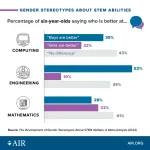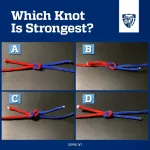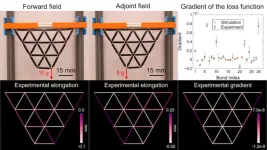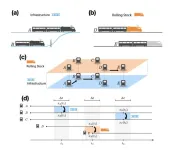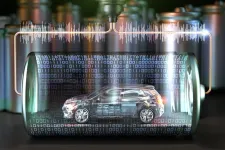(Press-News.org) SAN ANTONIO — December 9, 2024 —Southwest Research Institute has announced a groundbreaking joint industry project (JIP) to help spur the growth and innovation of fueling technologies and infrastructure for hydrogen-powered heavy-duty vehicles.
SwRI’s H2HD REFUEL (Hydrogen Heavy Duty Refueling Equipment and Facilities Utilization Evaluation Laboratory) JIP aims to strengthen the acceptance of hydrogen fuel use by heavy-duty vehicles to help the mobility industry meet its decarbonization and zero-emissions goals by advancing hydrogen refueling station (HRS) technologies. Over the next four years, SwRI researchers will use hands-on experiments, system modeling and theoretical studies to strengthen existing HRS equipment and procedures and explore potential alternatives.
“There are less than sixty hydrogen refueling stations in the U.S., but only one or two currently exist that can meet the specific needs of heavy-duty hydrogen-powered vehicles,” said Dr. Thomas E. Briggs, Jr., Institute engineer with SwRI’s Powertrain Engineering Division. “Many light-duty hydrogen stations face significant technical challenges, including supply chain issues, mechanical failures, and lack of infrastructure. Considering the multimillion-dollar investment per station, these issues reflect a significant technology gap that industry and government must bridge before building additional heavy-duty refueling stations.”
The H2HD REFUEL JIP hopes to address these issues by connecting hydrogen vehicle manufacturers, original equipment manufacturers (OEMs) and refueling station operators to develop innovative, dependable and compatible HRS technologies.
The four-year program will investigate a broad range of HRS-related topics to help solve existing technical challenges, such as discovering the best onboard hydrogen storage method: liquid, H70 gas or cryo-compression, and comparing the performances of refueling station flow components. The JIP also plans to study hydrogen losses from cryogenic systems that occur from boil-off and system inefficiencies.
“Connecting industry stakeholders is vital to developing compatible and reliable hydrogen refueling technologies and associated infrastructure,” said Angel Wileman, the JIP’s project manager from SwRI’s Mechanical Engineering Division. “H2HD REFUEL’s comprehensive approach will ensure that the industry can meet the growing demand for heavy-duty hydrogen vehicles efficiently and safely. This JIP is another example of how SwRI is leading the way when it comes to hydrogen energy research.”
H2HD REFUEL members will benefit from access to SwRI-led cutting-edge research and hydrogen storage system models. Members can also participate in interactive workshops and bi-annual meetings for networking and knowledge sharing and gain valuable economic and performance insights for different hydrogen storage systems.
Learn more about how SwRI Consortia and JIPs enable clients to pool their R&D dollars for pre-competitive research they can apply to their products and services.
For more information, visit the https://www.swri.org/industry/hydrogen-heavy-duty-refueling-equipment-facilities-utilization-evaluation-laboratory-h2hd.
END
SwRI announces joint industry program aimed at advancing heavy-duty hydrogen refueling infrastructure
H2HD Refuel JIP will research and develop technologies to benefit hydrogen-powered heavy-duty refueling operations
2024-12-09
ELSE PRESS RELEASES FROM THIS DATE:
Webb telescope’s largest study of universe expansion confirms challenge to cosmic theory
2024-12-09
New observations from the James Webb Space Telescope suggest that a new feature in the universe—not a flaw in telescope measurements—may be behind the decadelong mystery of why the universe is expanding faster today than it did in its infancy billions of years ago.
The new data confirms Hubble Space Telescope measurements of distances between nearby stars and galaxies, offering a crucial cross-check to address the mismatch in measurements of the universe’s mysterious expansion. Known as the Hubble tension, the discrepancy remains unexplained even by the best cosmology models.
“The ...
By age six, children think boys are better than girls at computing and engineering, new American Institutes for Research study shows
2024-12-09
Arlington, Va. – Children as young as age 6 develop gender stereotypes about computer science and engineering, viewing boys as more capable than girls, according to new results from an American Institutes for Research (AIR) study. However, math stereotypes are far less gendered, showing that young children do not view all science, technology, engineering, and math (STEM) fields as the same.
These new findings come from the largest-ever study on children’s gender stereotypes about STEM and verbal abilities, based on data from 145,000 children across 33 nations, synthesizing more than 40 years of ...
Hair growth drug safe at low doses for breast cancer patients
2024-12-09
Hair loss during chemotherapy can cause enough distress for some women to lose self-confidence, which experts say may discourage them from seeking chemotherapy in the first place.
Oral minoxidil is a commonly prescribed treatment for hair loss. The drug is also the active ingredient in over-the-counter Rogaine. The prescription treatment is known, however, to dilate blood vessels, and experts worry that this could increase the heart-related side effects of chemotherapy and lead to chest pain, shortness of breath, or fluid buildup.
Now, a study in women with breast cancer suggests that low oral doses of minoxidil, taken during ...
Giving a gift? Better late than never, study finds
2024-12-09
COLUMBUS, Ohio – If you feel terrible about giving a late gift to a friend for Christmas or their birthday, a new study has good news for you.
Researchers found that recipients aren’t nearly as upset about getting a late gift as givers assume they will be.
“Go ahead and send that late gift, because it doesn’t seem to bother most people as much as givers fear,” said Cory Haltman, lead author of the study and doctoral student in marketing at The Ohio State University’s Fisher College of Business.
In a series of six studies, Haltman and his colleagues explored the mismatch between givers’ ...
Judging knots throws people for a loop
2024-12-09
We tie our shoes, we put on neckties, we wrestle with power cords. Yet despite deep familiarity with knots, most people cannot tell a weak knot from a strong one by looking at them, new Johns Hopkins University research finds.
Researchers showed people pictures of two knots and asked them to point to the strongest one. They couldn’t.
They showed people videos of each knot, where the knots spin slowly so they could get a good long look. They still failed.
People couldn’t even manage it ...
Not so simple machines: Cracking the code for materials that can learn
2024-12-09
It's easy to think that machine learning is a completely digital phenomenon, made possible by computers and algorithms that can mimic brain-like behaviors.
But the first machines were analog and now, a small but growing body of research is showing that mechanical systems are capable of learning, too. Physicists at the University of Michigan have provided the latest entry into that field of work.
The U-M team of Shuaifeng Li and Xiaoming Mao devised an algorithm that provides a mathematical framework for how learning works in lattices called ...
Finding the weak points: New method to prevent train delay cascades
2024-12-09
[Vienna, 09.12.2024] —Train delays are not only a common frustration for passengers but can also lead to significant economic losses, especially when they cascade through the railway network. When a train is delayed, it often triggers a chain reaction, turning minor issues into widespread delays across the system. This can be costly. A report from the Association of American Railroads (AAR) indicates that a nationwide rail disruption in the US could cost the economy over $2 billion per day. Therefore, the pressing question for railway operators is: How to manage the cascading effect of delays efficiently ...
New AI cracks complex engineering problems faster than supercomputers
2024-12-09
Modeling how cars deform in a crash, how spacecraft responds to extreme environments, or how bridges resist stress could be made thousands of times faster thanks to new artificial intelligence that enables personal computers to solve massive math problems that generally require supercomputers.
The new AI framework is a generic approach that can quickly predict solutions to pervasive and time-consuming math equations needed to create models of how fluids or electrical currents propagate through different ...
Existing EV batteries may last up to 40% longer than expected
2024-12-09
The batteries of electric vehicles subject to the normal use of real world drivers - like heavy traffic, long highway trips, short city trips, and mostly being parked - could last about a third longer than researchers have generally forecast, according to a new study by scientists working in the SLAC-Stanford Battery. Center, a joint center between Stanford University's Precourt Institute for Energy and SLAC National Accelerator Laboratory, This suggests that the owner of a typical EV may not need to replace the expensive battery pack or buy a new car for several additional years.
Almost always, battery scientists and engineers have tested ...
Breakthrough AI model can translate the language of plant life
2024-12-09
A pioneering Artificial Intelligence (AI) powered model able to understand the sequences and structure patterns that make up the genetic “language” of plants, has been launched by a research collaboration.
Plant RNA-FM, believed to be the first AI model of its kind, has been developed by a collaboration between plant researchers at the John Innes Centre and computer scientists at the University of Exeter.
The model, say its creators, is a smart technological breakthrough that can drive discovery and innovation in plant science and potentially across the study of invertebrates ...
LAST 30 PRESS RELEASES:
Mayo Clinic installs first magnetic nanoparticle hyperthermia system for cancer research in the US
Calibr-Skaggs and Kainomyx launch collaboration to pioneer novel malaria treatments
JAX-NYSCF Collaborative and GSK announce collaboration to advance translational models for neurodegenerative disease research
Classifying pediatric brain tumors by liquid biopsy using artificial intelligence
Insilico Medicine initiates AI driven collaboration with leading global cancer center to identify novel targets for gastroesophageal cancers
Immunotherapy plus chemotherapy before surgery shows promise for pancreatic cancer
A “smart fluid” you can reconfigure with temperature
New research suggests myopia is driven by how we use our eyes indoors
Scientists develop first-of-its-kind antibody to block Epstein Barr virus
With the right prompts, AI chatbots analyze big data accurately
Leisure-time physical activity and cancer mortality among cancer survivors
Chronic kidney disease severity and risk of cognitive impairment
Research highlights from the first Multidisciplinary Radiopharmaceutical Therapy Symposium
New guidelines from NCCN detail fundamental differences in cancer in children compared to adults
Four NYU faculty win Sloan Foundation research fellowships
Personal perception of body movement changes when using robotic prosthetics
Study shows brain responses to wildlife images can forecast online engagement — and could help conservation messaging
Extreme heat and drought at flowering could put future wheat harvests at risk
Harlequin ichthyosis: a comprehensive review of pathogenesis, diagnosis, and management
Smithsonian planetary scientists discover recent tectonic activity on the Moon
Government censorship of Chinese chatbots
Incorporating a robotic leg into one’s body image
Brain imaging reveals how wildlife photos open donor wallets
Wiley to expand Advanced Portfolio
Invisible battery parts finally seen with pioneering technique
Tropical forests generate rainfall worth billions, study finds
A yeast enzyme helps human cells overcome mitochondrial defects
Bacteria frozen in ancient underground ice cave found to be resistant against 10 modern antibiotics
Rhododendron-derived drugs now made by bacteria
Admissions for child maltreatment decreased during first phase of COVID-19 pandemic, but ICU admissions increased later
[Press-News.org] SwRI announces joint industry program aimed at advancing heavy-duty hydrogen refueling infrastructureH2HD Refuel JIP will research and develop technologies to benefit hydrogen-powered heavy-duty refueling operations

